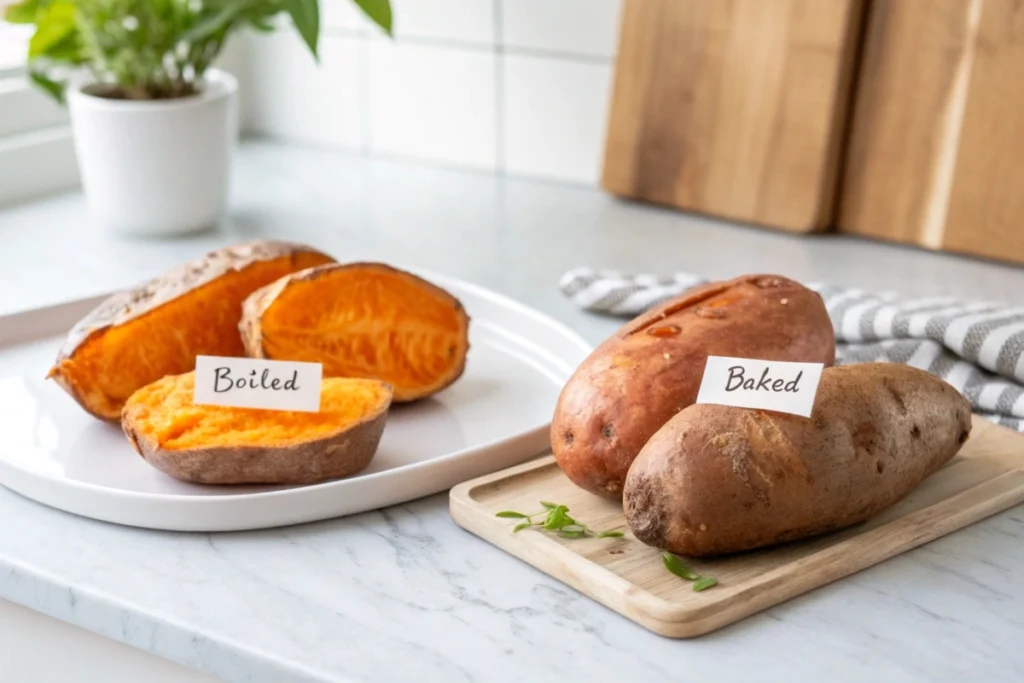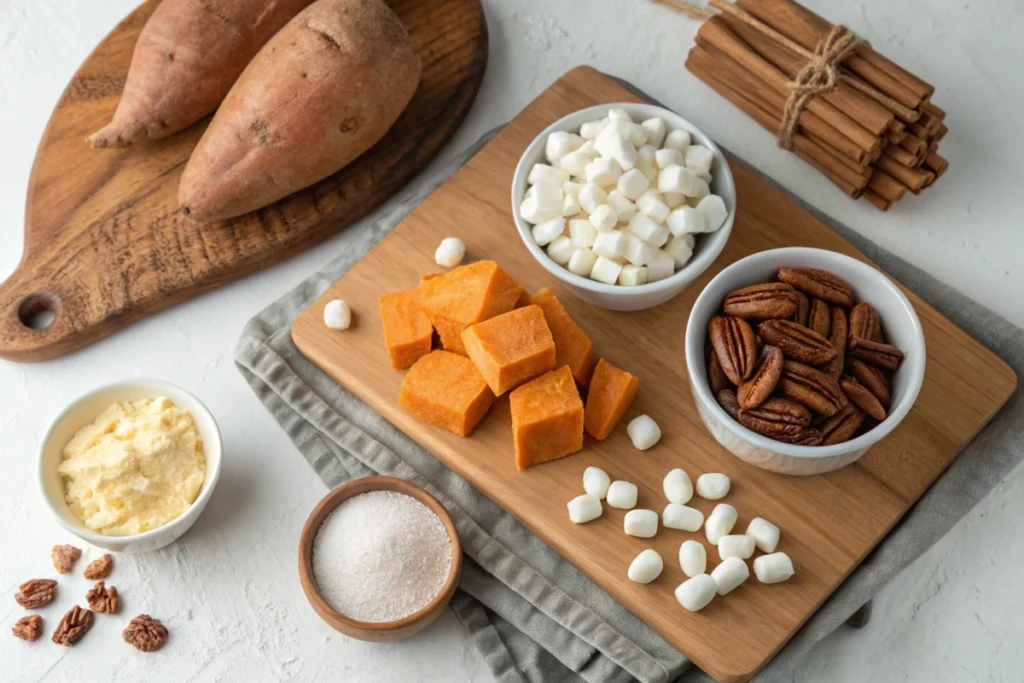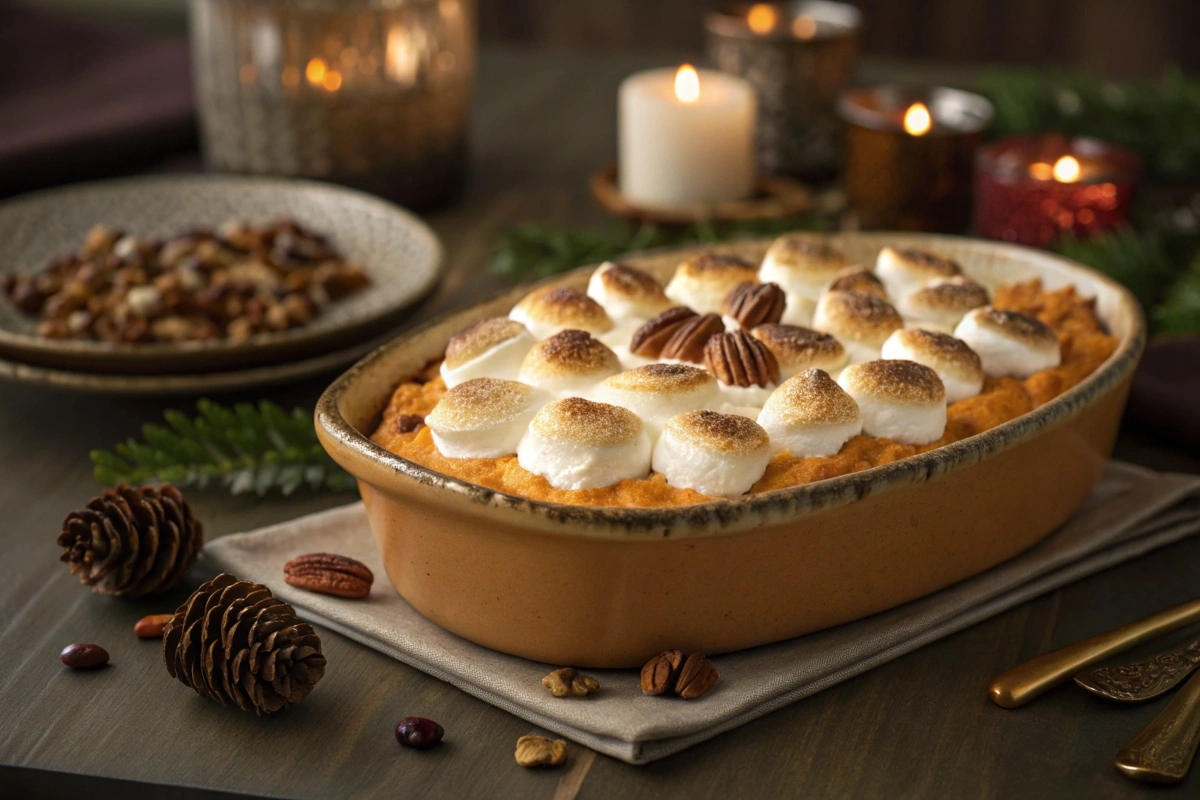Is it better to boil or bake sweet potatoes for a casserole? Discover if boiling or baking sweet potatoes for a casserole is best. Learn cooking tips, recipe methods, and expert advice to perfect every bite.
Introduction
Welcome to this comprehensive guide on sweet potato casseroles. Here, we will examine whether Is it better to boil or bake sweet potatoes for a casserole? This question has puzzled home cooks who want to lock in flavor, nutrition, and texture. Below, we’ll discuss each approach in detail. We’ll also share professional insights, tips, and a full recipe. With this knowledge, you’ll craft a memorable casserole every time. Let’s begin!
Is it better to boil or bake sweet potatoes for a casserole?
Sweet potatoes play a prominent role in American cooking. They appear at holiday tables and everyday family meals alike. However, the choice between boiling and baking can make all the difference in taste and texture. Basically, this first section clarifies why that question matters so much.
When you decide how to cook your sweet potatoes, consider their moisture. Is it better to boil or bake sweet potatoes for a casserole? depends on the outcome you want. Boiling adds extra moisture, which can change the texture of your dish. Baking, conversely, preserves some dryness but can enhance sweetness through caramelization. Generally, your goals for taste, nutrition, and consistency will guide your decision.
Below, we’ll break down how each method affects texture, flavor, and nutrients. Eventually, you can choose the technique that suits your preferences. Nevertheless, many cooks experiment until they find what they like best.
Is it better to boil or bake sweet potatoes for a casserole? Texture Insights
Texture often shapes the success of your sweet potato casserole. Indeed, sweet potatoes turn soft when heated, but how they reach that softness matters. Boiling these tubers involves submerging them in water, which leads to extra moisture seeping inside. Consequently, the flesh can become mushy if you are not careful with cook times.
Baking, on the other hand, allows the sweet potatoes to lose moisture. As a result, the flesh becomes dense and sweet. Some cooks prefer that firmer consistency for easy slicing. However, if you overbake, the edges might dry out. Still, many find that baking yields a fluffy interior while preserving more robust flavors.

Comparatively, choosing the best texture depends on personal taste. Nonetheless, a casserole usually benefits from sweet potatoes that hold shape and have a slight natural sweetness. That is why many chefs lean toward baking. Yet, we will see more in the next sections that boiling has certain advantages, too.
Is it better to boil or bake sweet potatoes for a casserole? Flavor Differences
Flavor is another key determinant. When boiled, sweet potatoes may taste mild. That is because much of the inherent sweetness dissolves into the cooking water. Consequently, you might need to add extra seasonings later to enhance the flavor.
Baking is different. Dry heat encourages caramelization of natural sugars. This process deepens the potato’s sweetness. Hence, many people prefer that subtle caramel note. Additionally, baking helps rid the flesh of some water, thereby concentrating flavor.
Nonetheless, you can still boil sweet potatoes and achieve good taste if you know how to season them. Salt, spices, or even a splash of broth can make up for flavor leached into the water. Comparatively, each cooking method can yield excellent results. Therefore, the choice boils down to your flavor preference and how you plan to assemble the casserole.
Is it better to boil or bake sweet potatoes for a casserole? Nutritional Considerations
Undoubtedly, nutritional value matters when preparing any dish. Sweet potatoes are naturally rich in beta-carotene, vitamin C, vitamin B6, dietary fiber, and more. Boiling and baking can both preserve these nutrients. Nonetheless, there are small differences worth noting.
When you boil sweet potatoes, certain water-soluble vitamins may leach out. Yet, the short cooking times often recommended for casseroles minimize this loss. Baking sweet potatoes usually retains more of the natural vitamins and minerals. Thus, if maximizing nutrients is your top priority, you might favor baking.
Still, the difference in nutrient retention can be minimal if you time your boiling correctly. Overall, neither method eliminates the essential vitamins that make sweet potatoes beneficial. Ultimately, it is best to choose your cooking method based on flavor and texture needs. In the next section, we will delve deeper into the science behind boiling and baking, so you can make a fully informed decision.
The Science Behind Boiling and Baking
Cooking sweet potatoes involves changes to starches, sugars, and fibers. Initially, raw sweet potatoes have rigid cell walls that must be softened. When you boil them, hot water breaks down these walls quickly. Comparatively, when you bake them, they soften more gradually under steady heat.
Boiling:
- Water transfers heat more efficiently than air.
- Sweet potatoes cook faster, depending on thickness.
- The vegetable can absorb excess water if overcooked.
Baking:
- Hot air in the oven heats the sweet potatoes more slowly.
- Caramelization of sugars occurs, enhancing sweetness.
- Overcooking leads to dryness or a stringy texture in some cases.
Basically, baking allows sweet potatoes to retain a more intense taste. Meanwhile, boiling often leads to a softer texture and possibly easier mashing. Chiefly, pick the method that suits your final dish. Because sweet potatoes have a high natural sugar content, you must be cautious about burning when baking. Indeed, cooking them at a moderate temperature—around 375°F to 400°F—helps prevent scorching.
In many households, convenience drives the choice. If you are short on time, boiling might be faster. Yet, if you want a richer sweet potato flavor, plan ahead for baking. Either way, watch your timings. Overcooking can negatively affect your final casserole, making it runny or too dense.
Is it better to boil or bake sweet potatoes for a casserole? According to Experts
Chefs and cooking enthusiasts often debate the question: Is it better to boil or bake sweet potatoes for a casserole? Some swear by baking, claiming it unlocks more flavor. Others note that boiling is more efficient and works fine if you properly season the dish afterward.
Expert Insights
- Professional chefs often lean toward baking. They argue it intensifies sweetness while allowing more control over texture.
- Busy home cooks might prefer boiling for speed. They may also appreciate the smoother texture for quick mashing.
- Dietitians stress that sweet potatoes remain nutritious either way, especially if you limit sugar or high-calorie toppings.
Furthermore, experts highlight that your casserole’s other ingredients matter, too. If your recipe includes butter, cream, or sweeteners, you might not need the extra sweetness from baking. Conversely, if your dish relies on the natural flavors of the sweet potatoes, baking can be advantageous. Additionally, consider how you plan to season the potatoes. Boiling them in a tasty broth or salted water can help them absorb savory notes.
Basically, there is no universal right or wrong answer. Nonetheless, many chefs find that baked sweet potatoes give a more robust mouthfeel. Consequently, the final casserole has that classic sweet potato essence. Especially if you intend to keep the sugar content moderate, baking is a solid choice. Nevertheless, in some cases, boiling yields an equally delightful result.
Step-by-Step Sweet Potato Casserole Recipe
Now that we have covered the essential points, it’s time to put theory into practice. Here is a detailed recipe that showcases both cooking methods. Choose whichever technique you prefer—boiling or baking. This recipe provides instructions for each.
Ingredients
- 3 large sweet potatoes (about 2 pounds total)
- 1 cup whole milk (or a dairy-free alternative)
- 4 tablespoons unsalted butter (melted)
- ½ cup light brown sugar (adjust to taste)
- 1 teaspoon salt
- ½ teaspoon ground cinnamon
- ¼ teaspoon ground nutmeg
- ¼ teaspoon black pepper
- 1 teaspoon vanilla extract
- 2 large eggs (optional for binding)
- 1 cup chopped pecans or walnuts (optional topping)
- Mini marshmallows (optional topping)

Basically, these ingredients balance sweetness and savory notes. Many choose to add eggs for a richer, fluffier texture. However, you can omit them for a vegan alternative. Meanwhile, the nuts and marshmallows on top provide a crunchy or gooey finish.
Instructions: Boiling Version
- Prep the sweet potatoes: Peel and chop them into evenly sized chunks.
- Boil: Place the chunks in a pot of water. Add a pinch of salt. Bring the water to a gentle boil. Cook until fork-tender, about 15–20 minutes. Drain thoroughly.
- Mash: Use a potato masher or large fork to mash the sweet potatoes. Leave some small lumps if you like texture.
- Combine wet ingredients: In a separate bowl, whisk together milk, melted butter, brown sugar, salt, cinnamon, nutmeg, pepper, and vanilla. Stir until everything is well-blended.
- Mix: Add the mashed sweet potatoes to the wet ingredient bowl. Mix until fully combined. If using eggs, beat them in at this stage.
- Adjust seasoning: Taste the mixture. Consequently, add more sugar or salt if desired.
- Assemble: Transfer the mixture into a greased casserole dish. Top with chopped pecans, walnuts, or marshmallows if you prefer.
- Bake: Place the dish in a preheated oven at 350°F. Bake for about 25–30 minutes until the top is golden brown and bubbling.
Instructions: Baking Version
- Prep the sweet potatoes: Rinse and scrub them thoroughly. You can peel them after baking if you prefer.
- Bake: Poke a few holes in the sweet potatoes with a fork. Place them on a baking sheet lined with foil. Bake at 400°F for 45–60 minutes, until soft.
- Cool and peel: Remove the sweet potatoes from the oven and let them cool slightly. Peel away the skins.
- Mash: Mash the baked sweet potatoes in a bowl. The flesh should be fluffy.
- Combine wet ingredients: In a separate bowl, whisk together milk, melted butter, brown sugar, salt, cinnamon, nutmeg, pepper, and vanilla. Stir well.
- Mix: Fold the mashed sweet potatoes into the wet mixture. Then add eggs if you want a lighter texture.
- Assemble: Pour the mixture into a greased casserole dish. Optionally, top with your preferred garnish.
- Final bake: Slide the dish into a 350°F oven. Bake for 20–25 minutes until the top is lightly browned.
Regardless of your chosen method, keep an eye on the casserole. Eventually, the center should be firm but still moist. You don’t want it to dry out. Above all, the goal is to let the sweet potato flavor shine. Because these methods emphasize different aspects, try both to see which you prefer.
Additional Tips for Perfect Results
- Avoid a watery casserole: Drain boiled sweet potatoes thoroughly or allow baked sweet potatoes to cool, so they release steam.
- Enhance flavors: Add a dash of orange zest or a sprinkle of ginger for a fresh twist.
- Balance sweetness: If using marshmallows, reduce the brown sugar to prevent an overly sweet dish.
- Use quality tools: Choose a sturdy casserole dish and a reliable thermometer to check doneness.
Following these tips will help you consistently produce a perfect casserole. Boiled or baked, your sweet potato dish can impress guests at any gathering. Indeed, the next section will conclude our debate on Is it better to boil or bake sweet potatoes for a casserole? while also recapping a few essential points.
Is it better to boil or bake sweet potatoes for a casserole? A Detailed Comparison
When you step back and look at the bigger picture, Is it better to boil or bake sweet potatoes for a casserole? largely depends on personal preference. Both methods yield delicious results, but each has unique benefits. Below is a direct comparison to help you decide:
- Flavor: Baking typically produces a sweeter, more intense flavor due to caramelization. Boiling results in a milder taste, but you can enhance it with spices and sweeteners.
- Texture: Boiled sweet potatoes tend to be extra soft and moist. Baked sweet potatoes can become fluffy with a slightly drier consistency.
- Nutrition: Baking often preserves slightly more nutrients, while boiling can diminish water-soluble vitamins. Nonetheless, both methods retain the majority of beneficial compounds.
- Convenience: Boiling might be faster, especially if you are short on oven space. Baking can take longer, but it is largely hands-off time.
All things considered, you cannot go wrong with either choice. If you want a denser and sweeter casserole, baking is the way to go. Meanwhile, if you like a smoother mash or have limited time, boiling is a practical alternative. Ultimately, your casserole will taste splendid as long as you pay attention to cook times and seasonings.
Nutritional Information
Sweet potatoes are packed with vitamins, minerals, and fiber. The following table shows approximate values per 100g of cooked sweet potato (no added ingredients):
| Nutrient | Amount (per 100g) |
|---|---|
| Calories | 90 kcal |
| Carbohydrates | 21 g |
| Dietary Fiber | 3 g |
| Protein | 2 g |
| Fat | 0.2 g |
| Vitamin A | ~14,000 IU |
| Vitamin C | 2.4 mg |
| Vitamin B6 | 0.2 mg |
| Potassium | 300 mg |
| Calcium | 38 mg |
Comparatively, sweet potatoes stand out as a nutrient-dense food. Chiefly, they are a great source of beta-carotene, which can support eye health and immune function. Equally, they offer a moderate amount of fiber that aids digestion. In general, whether you boil or bake them, sweet potatoes remain a wholesome choice.
Frequently Asked Questions (FAQ)
1. Is it better to bake or boil sweet potatoes?
Many cooks prefer baking for a richer flavor. However, boiling can be faster if you plan to mash them. Choose based on your desired texture and time constraints.
2. Is it better to bake or boil sweet potatoes for pie?
Pie fillings often need a smooth consistency and a pronounced sweetness. Baking enhances sweetness through caramelization, which many find ideal for sweet potato pie. Nonetheless, boiled sweet potatoes also work if you season them well.
3. What is the best cooking method for sweet potatoes?
The best method depends on your preference. Baking preserves sweetness and nutrients. Boiling is faster and can be easier to mash. Both can yield delicious results with the right seasonings.
4. How do you make sweet potato casserole not runny?
Drain boiled sweet potatoes thoroughly to remove excess water. If you bake them, let them cool slightly to release steam. Also, monitor your liquids. Adding too much milk or butter can thin the mixture.
Conclusion
In conclusion, sweet potatoes offer exceptional versatility. They also boast an appealing sweetness that pairs well with savory elements. So, Is it better to boil or bake sweet potatoes for a casserole? The answer depends on your desired outcome. Indeed, baking draws out sweet flavors and yields a fluffier texture. Conversely, boiling is time-efficient and creates a softer, smoother consistency.
Altogether, both methods ensure that you can craft a delectable sweet potato casserole. Therefore, feel free to experiment until you find your perfect approach. Whichever route you choose, sweet potatoes bring color, taste, and nutrition to your table. Undoubtedly, your family and friends will appreciate the comforting goodness of your casserole.
Print
Is it better to boil or bake sweet potatoes for a casserole
- Total Time: 90 minutes (baking) or 65 minutes (boiling)
- Yield: 8 servings 1x
Description
Sweet potato casserole is a comforting and flavorful dish, perfect for holiday gatherings or a cozy family dinner. But is it better to boil or bake sweet potatoes for this classic dish? Baking enhances the natural sweetness and keeps the potatoes firm, while boiling creates a softer texture that blends seamlessly into a creamy base. This recipe guides you through both methods so you can choose your favorite and achieve the ultimate sweet potato casserole with a rich, buttery taste and a crunchy pecan topping.
Ingredients
- 3 large sweet potatoes (about 2 pounds total)
- 1 cup whole milk (or a dairy-free alternative)
- 4 tablespoons unsalted butter (melted)
- ½ cup light brown sugar (adjust to taste)
- 1 teaspoon salt
- ½ teaspoon ground cinnamon
- ¼ teaspoon ground nutmeg
- ¼ teaspoon black pepper
- 1 teaspoon vanilla extract
- 2 large eggs (optional for binding)
- 1 cup chopped pecans or walnuts (optional topping)
- Mini marshmallows (optional topping)
Instructions
Boiling version
- Prep the sweet potatoes: Peel and chop them into evenly sized chunks.
- Boil: Place the chunks in a pot of water. Add a pinch of salt. Bring the water to a gentle boil. Cook until fork-tender, about 15–20 minutes. Drain thoroughly.
- Mash: Use a potato masher or large fork to mash the sweet potatoes. Leave some small lumps if you like texture.
- Combine wet ingredients: In a separate bowl, whisk together milk, melted butter, brown sugar, salt, cinnamon, nutmeg, pepper, and vanilla. Stir until everything is well-blended.
- Mix: Add the mashed sweet potatoes to the wet ingredient bowl. Mix until fully combined. If using eggs, beat them in at this stage.
- Adjust seasoning: Taste the mixture. Consequently, add more sugar or salt if desired.
- Assemble: Transfer the mixture into a greased casserole dish. Top with chopped pecans, walnuts, or marshmallows if you prefer.
- Bake: Place the dish in a preheated oven at 350°F. Bake for about 25–30 minutes until the top is golden brown and bubbling.
Baking version
- Prep the sweet potatoes: Rinse and scrub them thoroughly. You can peel them after baking if you prefer.
- Bake: Poke a few holes in the sweet potatoes with a fork. Place them on a baking sheet lined with foil. Bake at 400°F for 45–60 minutes, until soft.
- Cool and peel: Remove the sweet potatoes from the oven and let them cool slightly. Peel away the skins.
- Mash: Mash the baked sweet potatoes in a bowl. The flesh should be fluffy.
- Combine wet ingredients: In a separate bowl, whisk together milk, melted butter, brown sugar, salt, cinnamon, nutmeg, pepper, and vanilla. Stir well.
- Mix: Fold the mashed sweet potatoes into the wet mixture. Then add eggs if you want a lighter texture.
- Assemble: Pour the mixture into a greased casserole dish. Optionally, top with your preferred garnish.
- Final bake: Slide the dish into a 350°F oven. Bake for 20–25 minutes until the top is lightly browned.
- Prep Time: 20 minutes
- Cook Time: 70 minutes (baking method) or 45 minutes (boiling method)
Nutrition
- Serving Size: 1/8 of recipe
- Calories: ~320 kcal
- Sugar: ~22g
- Sodium: ~180mg
- Fat: ~15g
- Saturated Fat: ~7g
- Unsaturated Fat: ~7g
- Trans Fat: ~0g
- Carbohydrates: ~45g
- Fiber: ~4g
- Protein: ~4g
- Cholesterol: ~55mg

